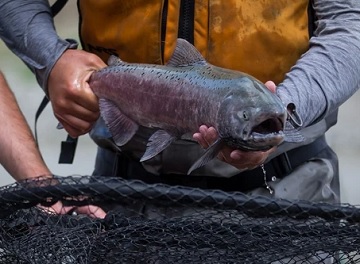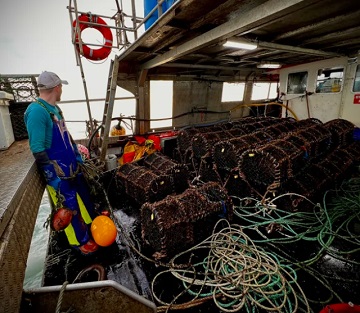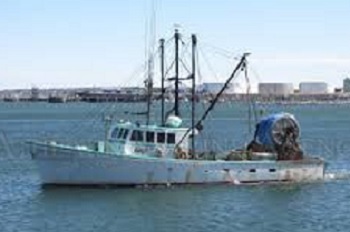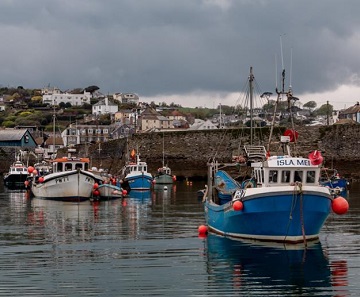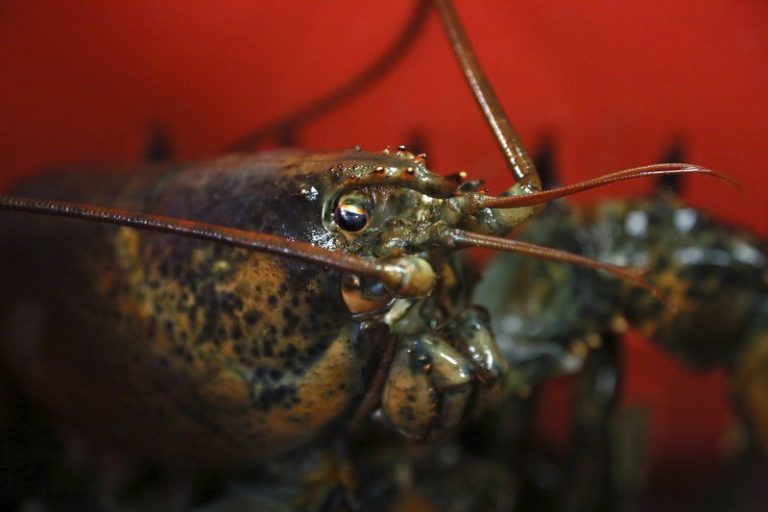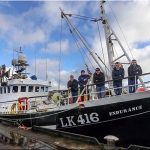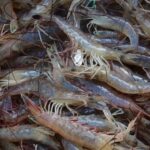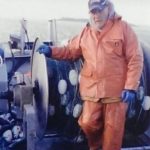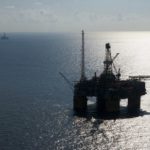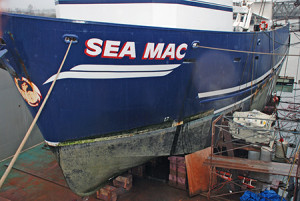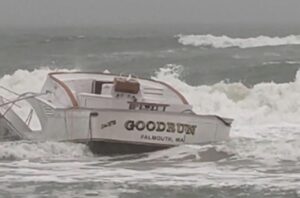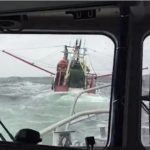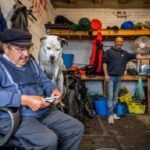Monthly Archives: August 2022

NOAA lays out plans for expanded testing of ropeless fishing technology
In an effort to address the two main causes of human-induced whale mortality, vessel strikes and entanglement in fishing gear, the National Oceanic and Atmospheric Administration recently released rules to reduce ship speeds and its “Ropeless Roadmap” to prepare for widespread adoption of ropeless fishing. The vertical lines that connect strings of traps on the ocean floor to buoys on the surface can get caught on a whale’s fins or in its mouth as it swims, leading to death in some cases. There are fewer than 350 North Atlantic right whales, according to NOAA. On-demand fishing gear would eliminate the need for the vertical lines in the water until the lobster trap, pot or gillnet is being hauled. >click to read< 15:50
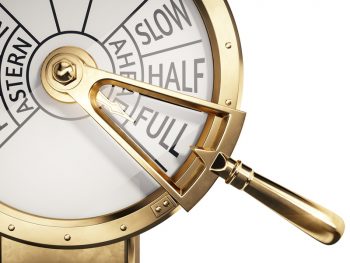
Some ship operators push back at rules requiring slowdown for whales
Federal regulators who want to enforce new vessel speed rules to help protect rare whales can expect some pushback from ship operators. The National Oceanic and Atmospheric Administration announced the new proposed rules, which are designed to protect the last remaining North Atlantic right whales, last month. The rules would expand seasonal slow zones off the East Coast and require more vessels to comply with the rules. The American Pilots’ Association is concerned the new rules would make operations more hazardous for pilot boats, said Clayton Diamond, executive director of the group. >click to read< 13:41
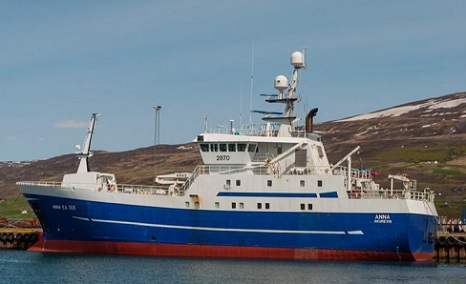
Atlantic fishing fleets ditch gill nets in favour of hook-and-line technology
The goal is higher-quality fish. That’s why one Canadian offshore fishing company is ditching gill nets in favour of hook-and-line fishing. The Arctic Fishery Alliance of Nunavut just bought a 52-metre longliner from Iceland to fish its quota of Greenland halibut (turbot) in the Davis Strait, near the Arctic Circle. In addition to adding modern processing equipment on board, the vessel will be fitted with a Mustad longline system, enabling the ship to deploy 40,000 fishing hooks daily. To fetch the best possible price in the market, a turbot fillet must be pure white. “And you don’t get that using gill nets,” said Earle. >click to read< 10:53
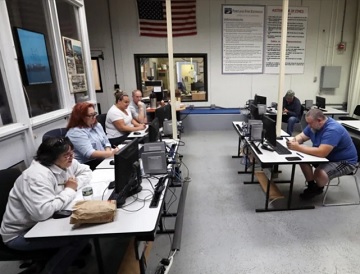
Portland Fish Exchange’s future murky as sales plummet
The future course of the Portland Fish Exchange is deeply uncertain but will likely be set this fall. The exchange, which was opened by the city in 1986, has provided nearly daily auctions of fish on the Portland Fish Pier. It was seen as a solid market-based alternative to the long-standing system that saw many fishermen turn their catch over to pier owners, who then trucked the fish out of state and tried to get a good price for them in markets elsewhere in New England or in New York. Last year, it hit rock bottom, with only 1.4 million pounds of fish auctioned. Some daily auctions were canceled because there simply wasn’t enough cod, haddock, flounder and halibut to attract commercial buyers. >click to read< 09:15
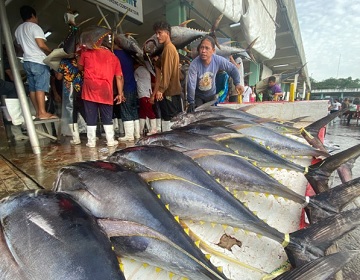
Philippines’ tuna industry reels from rising fuel prices
Veteran longline fisherman Miguel Mayola eased his boat gingerly into the port of General Santos City after a month at sea with his crew in deep waters off Bongao, a finger-shaped island at the southwestern tip of the Philippines. The 39-year-old captain, his leathery face weather-beaten by years of toiling in an industry that has made many buyers rich from the tuna he fishes, was now waiting to see whether his prized catch could net him enough money. He needed the cash for his family and 13-man crew, and to fund another fishing expedition. “It’s hard work but we can’t do anything. It’s really hard with prices of crude and gasoline rising, and our families have nobody to rely on but us fishermen,” Mayola said. >click to read< 07:55
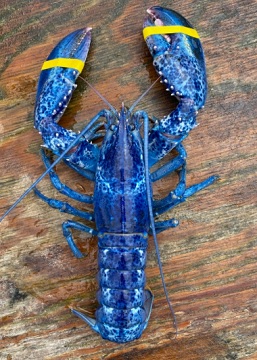
Portland lobstermen catch rare blue lobster
A father and son fishing in Casco Bay Thursday morning caught a rare, blue lobster that will be preserved in a tank at one of the Portland waterfront’s best-known restaurants. The lobster, which is bright blue, was caught in the ocean waters beyond Peaks Island, said Luke Rand, who serves as sternman on his father’s boat, the Audrey B. Rand. Rand, 36, has been fishing since he was 16. “We’ve never pulled one this color or even seen one to throw back,” said Rand, who lives in Falmouth. His dad, Mark Rand, has been fishing for more than 40 years. Video, photo, >click to read< 14:44
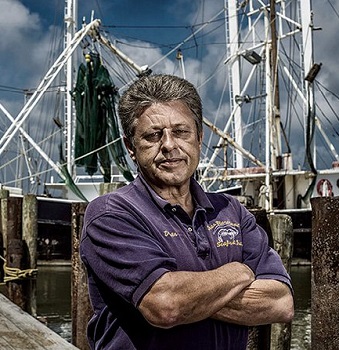
The Dead Zone – Nothing Here Gets Out Alive
With an easy drawl, Dean Blanchard, the owner of Dean Blanchard Seafood in the barrier-island town of Grand Isle, Louisiana, makes an understated observation: “There’s a reason they call it a dead zone. When the dead zone comes, everything’s dead. We can’t catch dead stuff. We’re in the live stuff business.” What Blanchard is talking about is the Gulf of Mexico “dead zone,” an enormous area in which, every spring, an overgrowth of algae and other vegetation absorbs dissolved oxygen from the water and kills all animal life. “This year,” Blanchard says, “we had shrimp jumping on the beach, committing suicide, trying to get out of the water because there’s no oxygen.” The result is an economic disaster. To find live shrimp, fishers have to ply their boats as far as fifty miles from shore. “With the price of fuel, you don’t want to go too far,” Blanchard says. His company’s annual haul has declined from twelve million pounds of shrimp a year to under five million. He used to employ sixty workers—now he’s down to thirty. >click to read< 11:49
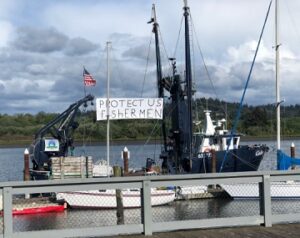
Oregon Senators, Governor responds to offshore wind farms concerns during clean energy tour
During a clean energy tour of Oregon, KATU questioned the US Secretary of Energy, Jennifer Granholm, Oregon Senators Ron Wyden, Jeff Merkley and Governor Kate Brown on issues surrounding wind farms slated for the Southern Oregon Coast. “It’s too early honestly we don’t know it’s a lot like the wave energy technology it’s still being built it’s still being created,” said Oregon Gov. Kate Brown when asked if she would advocate funding for preliminary wind farm testing ahead of federal leases planed for Southern Oregon offshore areas. “We really need to understand all of the impacts upfront before we rush into this,” said Heather Mann Executive Director of the Midwater Trawlers’ cooperative. >click to read< 09:56
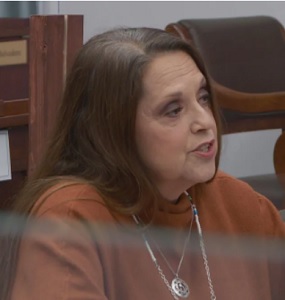
Lennox Island treaty fishers join P.E.I.’s fall lobster fishery for 1st time
For the first time, and possibly the last time, treaty fishers from Lennox Island First Nation are taking part in Prince Edward Island’s fall lobster fishery. Crews in two boats began setting out the first 400 treaty traps Thursday morning from the wharf at Borden on the Island’s south shore. “There are some fishermen there who we spoke to and who are opening their arms and welcoming us there. So we’re really appreciative of that,” said Lennox Island Chief Darlene Bernard. In the future, Bernard said Lennox Island intends to fish all of its 1,000 treaty traps during the spring season – when boats can operate out of their own wharf. >click to read< 08:30
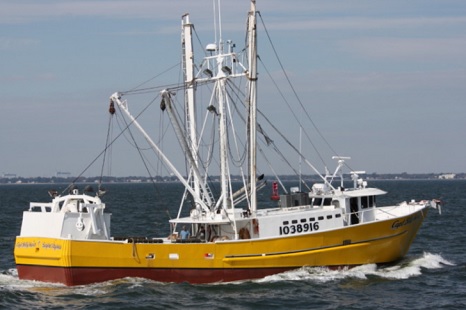
F/V Captain Billy Haver: Virginia Man Sentenced for Assault, Murdering Co-Worker on Scallop Boat
On Sept. 23, 2018, F/V Captain Billy Haver scalloping vessel was sailing approximately 50 miles off the Nantucket coast with seven crew members, including Meave Vasquez and his three future victims, prosecutors said. While working inside the shucking house, officials said that Meave Vasquez used a hammer to strike his first victim in the head, knocking him unconscious. As part of his guilty plea, Meave Vasquez admitted that he then walked onto the deck and stabbed a second victim repeatedly with a long fishing knife, at which point a third man climbed up from the ice hold and was struck in the head with the hammer. Prosecutors said that the third victim fell back down the ladder with a head wound into the ice hold, which  Meave Vasquez closed and covered with a heavy basket of scallops to prevent the third crew member from escaping. Meave Vasquez was then confronted by the ship’s captain, who he stabbed during a struggle, then climbed on top of the rigging of the boat with the suspect hammer. >click to read< 07:07
Meave Vasquez closed and covered with a heavy basket of scallops to prevent the third crew member from escaping. Meave Vasquez was then confronted by the ship’s captain, who he stabbed during a struggle, then climbed on top of the rigging of the boat with the suspect hammer. >click to read< 07:07
Press Release from the Department of Justice – >click to read<
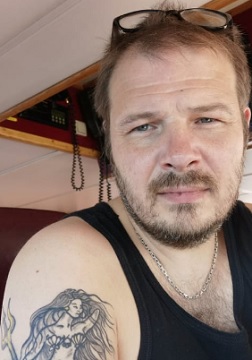
Captain of Faroese longliner cited 6 times in under year for halibut fishing violations on Grand Banks
For the sixth time since September, 2021 the captain of a Faroe Islands longliner has been issued a “notice of infringement” for an illegal fishing violation on the tail of the Grand Banks just outside Canadian waters. The notices were issued by DFO Fishery Officers during six separate inspections, once at sea and the remainder when the ship unloaded halibut in Bay Roberts. The “notices of infringement” against the captain of the Bordoyarnes were issued on Sept. 3rd and 16th, 2021, as well as May 17th, May 23rd, June 2nd, and July 1st of this year. DFO only recently updated its website on the most recent four infringements. The notices were all categorized as “serious” as they relate to the misreporting of catches (the four this year involved failing to maintain a logbook; the two from 2021 related to not properly recording discards) while the longliner was fishing halibut in fishing zone 3N on the tail of the Banks. After each inspection the longliner was allowed to return to the fishing grounds. photos, >click to read< 15:22
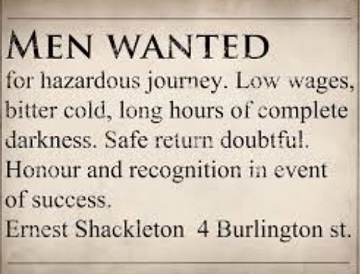
My Favorite Job Posting of All-Time. “Long journey on an old wooden boat to the worst place on Earth.”
Nothing highlights the difference between now and 100 years ago quite like this advertisement from Ernest Shackleton. Shackleton: “Long journey on an old wooden boat to the worst place on Earth. The trip is going to be super dangerous and terrible. In fact, you’ll probably die and if you don’t die you will definitely be miserable the entire time.” Imagine scrolling through craiglist and seeing an ad like this in 2022. I feel like the internet would take it down for safety reasons and then the people would get back to their video games and porn. Back then…that sounded like the opportunity of a lifetime. Fuck safety. Nothing beats a little glory and a call to adventure. The story of “Endurance” and Ernest is one of my absolute favorites. >click to read< 11:22
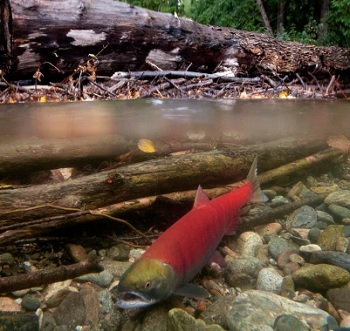
Commercial fishers and wild salmon advocates celebrate large returns to B.C. waters
Mitch Dudoward has worked in the salmon industry for more than 40 years and says fishing on the Skeena River in northwest B.C. has never been better. “This is the best season I can recall in my lifetime with the numbers we are catching,” said Dudoward, who recently completed a big sockeye haul aboard his gillnetter Irenda. Meanwhile, Bob Chamberlin, chairman of the First Nations Wild Salmon Alliance, said thousands of pink salmon are in Central Coast rivers after years of minimal returns. The strong run comes two years after the closure of two open-net Atlantic salmon farms in the area. “We got them removed and two years later we went from 200 fish in the river to where we have several thousand to date. In our mind and knowledge that is a really clear indicator.” >click to read< 10:41
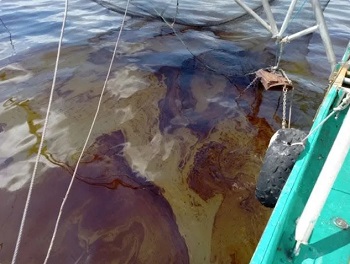
Oil spill in Terrebonne Bay on opening day of shrimp season causes grief for fishermen
A Terrebonne Bay oil spill on the first day of Louisiana’s inshore shrimp season has taken a toll on some local fishermen, who say they received no warning of the incident until many hours after it occurred and as a result ended up with fouled nets and oiled boats. The Coast Guard said it was notified through the National Response Center at 3:01 a.m. Monday that a tank platform collapsed at the Hilcorp Caillou Island facility in Terrebonne Bay. “I went out on the opening and I kept pushing all that night,” said Terrebonne Parish shrimper John Sophin. “I didn’t know about the spill, nobody warned me, I didn’t know where it was at.” >click to read< 08:54
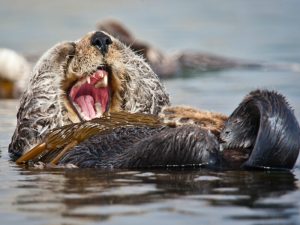
U.S. Fish and Wildlife Service Strategy to Reintroduce Sea Otters is Flawed
The USFWS study fails to estimate costs to taxpayers; impacts to key local fisheries such as Dungeness crab and sea urchin; neglects to fully examine the impacts to local port and harbor activities and fishing communities and fails to directly clarify to impacted Tribal Nations that no ceremonial and subsistence uses – or control of otter populations negatively impacting other important Tribal resources – are permitted under current Federal law. For Oregon and California coastal communities dependent on Dungeness crab, sea urchin, and other shellfish, reintroducing sea otters in an area where they have been absent for more than 100 years will spell big trouble. Yet, a recent report from the U.S. Fish and Wildlife Service (USFWS) concludes it is “feasible” to reintroduce them to Southern Oregon and Northern California. >click to read, with links< 08:19
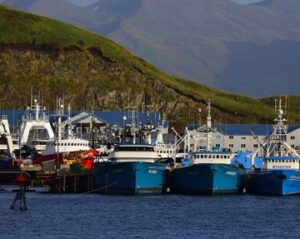
Regardless of party or office, Alaska candidates are targeting trawling
Republicans, Democrats and independents seeking a variety of elected offices across Alaska appear united by a desire to restrict deep-sea trawling. In candidate questionnaires submitted to the Alaska Beacon, candidates for statewide and legislative races, regardless of party, say the restrictions are the best way to improve salmon returns on the Yukon and Kuskokwim rivers. “I support efforts to reduce the wasteful bycatch of Alaska’s seafood by Seattle-based high seas fishing corporations,” said Mary Peltola, the Democratic candidate for Alaska’s U.S. House seat. “Science provides the best guide. However, I think most Alaskans agree it is past time to get high seas trawler bycatch under control,” said Tuckerman Babcock, a Republican candidate for an Alaska Senate district on the Kenai Peninsula. >click to read< 19:46
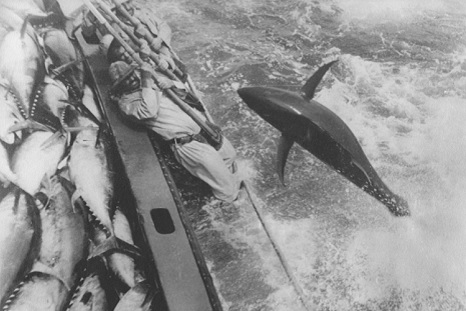
TUNAVILLE – Point Loma’s proud Portuguese past, and present
The Point Loma boundaries of Lowell to Talbot streets, and as high up the peninsula as Willow Street, by the 1930s, had earned the moniker “Tunaville.” Here has been home to an immigrant Portuguese populace settled as far back as 1885, and by the 1940s had become a bustling tuna fishermen’s haven. Early Portuguese fishing settlements grew along the base of Kellogg and McCall streets in La Playa and Roseville. Interestingly, the natural tidelands at the time meandered as far inland as today’s Scott Street. “In remarkably short order, each fisherman owned his own dory. photos, >click to read< 14:58
Athearn Marine Agency Boat of the Week: 56′ Duffy Stern Trawler, Cat 3408
Built by Webbers Cove, Blue Hill, Maine. 402HP, CAT 3408 Diesel, Auxiliary, Northern Lights 12KW Electric & Power, and more. To review specifications, information, and 10 photos’, >click here<, To see all the boats in this series >click here< 11:33
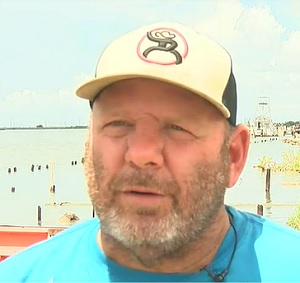
Louisiana shrimpers struggle to make ends meet after prices plummet
“We’re just steady shrimping for nothing,” Cameron Parish shrimper Anthony Theriot said. Theriot says the return on investment is making him reconsider leaving the dock each day. “It’s about $450 a day, with the price of fuel right now that’s 100 gallons of fuel with a little bit of snacks to eat, you go out, you catch 1,000 pounds of shrimp, 1,000 pounds of 50/60′s right now, you’re looking at $650 at 65 cents a pound, at $650, it costs $450 to go catch them, you have crew members looking at you wanting to make money so by the time you divide it all up, you have nothing there,” he said. Video, >click to read< 09:37

Australia: Commercial fishers eyeing compensation as six offshore wind farm zones get green light
Trawl fishers have ramped up calls for compensation following the federal government’s announcement that it will establish six offshore wind energy zones. Waters off Gippsland, Portland, the Hunter Valley, Illawarra, northern Tasmania, Perth and Bunbury have been earmarked for development. But fishers are concerned they will be excluded from the sections of the ocean where the turbines are built. The most progressed wind farm proposal is the Star of the South project in Gippsland. “The problem we have is that the federal government has already given out rights … to go commercial fishing. >click to read< 07:59
Australian offshore wind farms get green light in landmark announcement – >click to read<
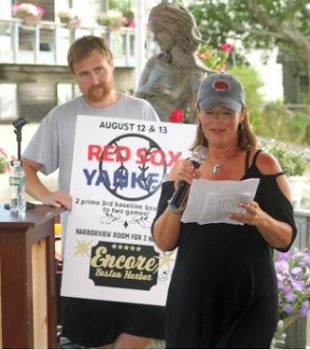
Fundraiser for Maine Lobstermen’s Association raises over $50K
With donations still rolling in, organizers of the fundraiser for the Maine Lobstermen’s Association held at Brady’s restaurant in Boothbay Harbor on Sunday, Aug. 7 report that over $50,000 has been raised. Proceeds from the event will go to the defense fund and will help with costs of MLA’s lawsuit against the National Marine Fisheries Service and National Oceanographic and Atmospheric Administration (NOAA) for their plan to require a 98% cut in the risk to right whales by 2030. MLA, represented by Stoel Rives, is challenging the plan in court. In November 2021, MLA launched a three-year, $10 million fundraising campaign to be used to help protect Maine’s lobstering heritage. Lots of photos! >click to read< 06:59
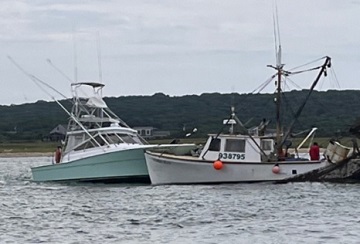
No injuries in two boat collision
On Friday, the Tomahawk, a charter fishing vessel out of Menemsha, collided with the F/V Gloria Jean, a Fairhaven fishing vessel. The U.S. Coast Guard deployed a Jayhawk helicopter from Air Station Cape Cod and surface vessels from Station Menemsha to assist the vessels. The Chilmark Harbormaster’s Department also responded. Petty Officer Briana Carter, a Coast Guard spokesperson, told The Times both vessels were brought back into port with, “No flooding on either vessel.” Carter also said no injuries were reported. “Don’t know if any charges will or will not be made,” she said. >10 Photos, click to read< 21:00
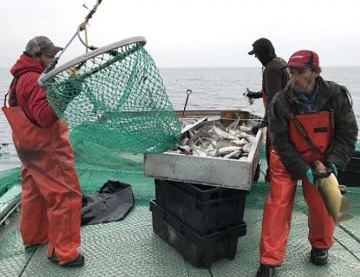
Inland Fisheries: Michigan Fish Producers Association says it’s settled lawsuit with DNR
The Michigan Fish Producers association has said its class-action lawsuit against the state Department of Natural Resources has reached a settlement. Details of the settlement have yet to be made public. The fish producers association sued the DNR over regulations that producers claimed interfered with their livelihoods. Michael Perry is an attorney who represents the association. Although the settlement amount is still undisclosed, Perry said commercial fishers are satisfied with it. “The association’s board of directors, members who participated in that were pleased with the result of the mediation,” said Perry. >click to read< 16:23
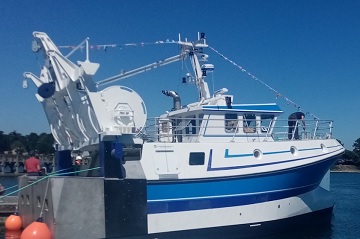
New Scalloper/Trawler for Le Havre
With a length of 11.98 metres and a breadth of 6 metres, Pierre Becquet’s new fishing boat was launched on 13th July at Locmiquélic in Morbihan. It will be delivered in August to the port of Le Havre, where the owner already runs the P’tit Pierre (ex-Tigrou), built in 2005 by the same yard as P’tit Gabin, Chantiers Navals Bernard. It is expected be ready and operational before the next scallop season. Photos, >click to read< 11:42
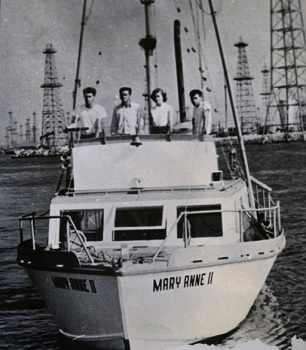
Long Beach man replicates family history with winning model boat
Over the past eight years, Bob Daley painstakingly built a fishing boat replica from scratch. Although it was on a much smaller scale this go around, it wasn’t the first time Bob constructed the vessel, affectionately dubbed the Mary Anne II. During the 1950s, Bob and his two brothers worked as fishermen to put themselves through college. Unable to afford a boat large enough to sustain their business, they built their own and named it the Mary Anne II after their youngest sister. From April 1950 to May 1951, the Daley family’s driveway in Long Beach served as a makeshift shipyard. Bob 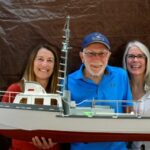 and his brothers worked on the Mary Anne II nearly every day as their mother watched from the kitchen window, wringing her hands. “She was kind of a worrier, always wondering what was going to go wrong,” Bob said. But she always brought the boys sandwiches for lunch. And Mary Anne, the boat’s namesake, tagged along with lemonade and fresh cookies. Photos, >click to read< 09:42
and his brothers worked on the Mary Anne II nearly every day as their mother watched from the kitchen window, wringing her hands. “She was kind of a worrier, always wondering what was going to go wrong,” Bob said. But she always brought the boys sandwiches for lunch. And Mary Anne, the boat’s namesake, tagged along with lemonade and fresh cookies. Photos, >click to read< 09:42
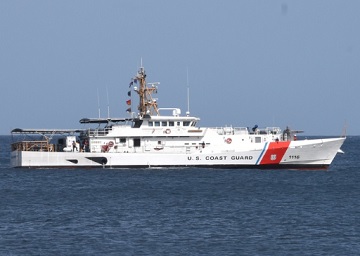
CG Cutter Winslow Griesser, fishing vessel collide north of Dorado, Puerto Rico resulting with fatality
The U.S. Coast Guard Cutter Winslow Griesser and the 23-foot commercial fishing vessel F/V Desakata were involved in a collision Monday afternoon, approximately four nautical miles north of Dorado, Puerto Rico. Following the collision, the crew of the cutter Winslow Griesser recovered the two fishermen aboard Desakata, identified as Carlos Rosario, who was fatally injured, and his brother Samuel Rosario Beltrán, who sustained injuries but survived the collision. Coast Guard watchstanders at Sector San Juan were notified of the incident by the cutter Winslow Griesser crew at approximately 2:19 p.m. Monday. >click to read< 07:52
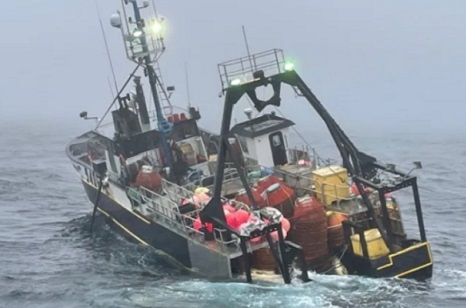
Supply ships, Coast Guard help rescue seven people and two dogs from sinking fishing vessel
“This was a good day. This is as best as you can hope for in a situation that’s grave like this,” said Mark Gould, a regional supervisor with the Coast Guard’s Marine Search and Rescue. The mayday call came around 1:00 a.m. from the F/V Gypsy Mariner, a fishing boat from Quebec, as it was taking on water about 60 nautical miles off St. John’s. The Maritime Rescue Sub Centre directed all nearby vessels to the scene. The two supply ships, the Atlantic Griffon and the Atlantic Shrike, and a Canadian Forces Hercules aircraft were the first to arrive at the scene. A Coast Guard cormorant helicopter arrived about 30 minutes later. “We did drop a pump to the vessel just in case there was a way to save it, but it quickly became clear that that wasn’t going to be an option,” >click to read< 21:33






